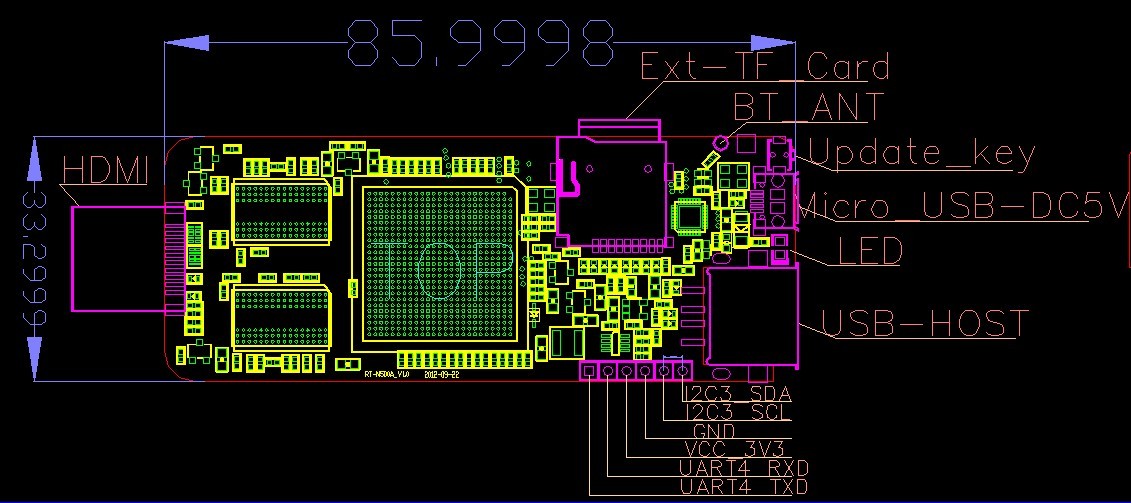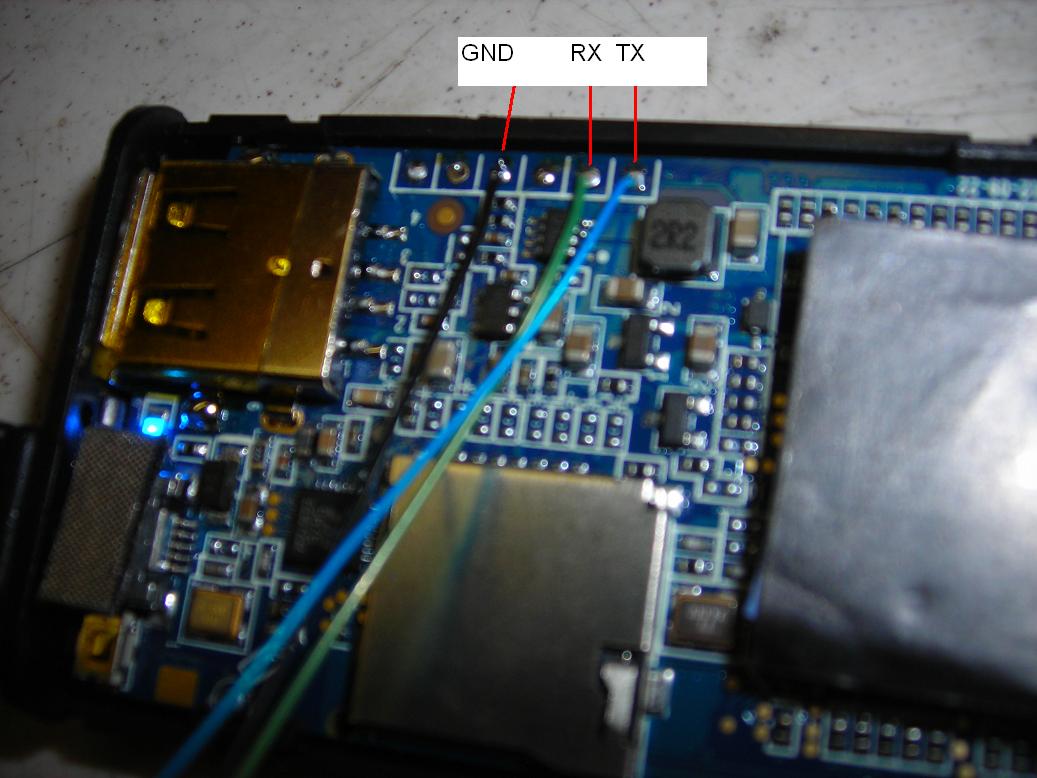|
|
|
https://github.com/imx6-dongle Bus 001 Device 045: ID 15a2:0054 Freescale Semiconductor, Inc. i.MX6Q SystemOnChip in RecoveryMode chrootroot@nuc:/tmp/n3# cp `which qemu-arm-static` usr/bin/ root@nuc:/tmp/n3# chroot . root@nuc:/# uname -a Linux nuc 4.4.0-1-amd64 #1 SMP Debian 4.4.4-1 (2016-03-07) armv7l GNU/Linux root@nuc:/# file /bin/bash /bin/bash: ELF 32-bit LSB executable, ARM, EABI5 version 1 (SYSV), dynamically linked (uses shared libs), for GNU/Linux 2.6.32, BuildID[sha1]=1a8601b954c83a01d91298d0f2f8f61ca033ebdd, stripped u-bootcompilehttps://github.com/imx6-dongle/wiki/wiki/U-Boot-basics dpavlin@nuc:/nuc/imx6/uboot-imx6dongle$ sudo apt-get install make gcc-arm-none-eabi libusb-1.0 export ARCH=arm export CROSS_COMPILE=arm-none-eabi- make gk802_config make dutpi@rpi2 ~/imx6/uboot-imx6dongle $ git remote -v origin https://github.com/imx6-dongle/uboot-imx6dongle (fetch) origin https://github.com/imx6-dongle/uboot-imx6dongle (push) pi@rpi2 ~/imx6/uboot-imx6dongle $ make gk802_config Configuring for gk802 - Board: gk802, Options: IMX_CONFIG=board/freescale/imx/ddr/mx6q_4x_mt41j128.cfg pi@rpi2 ~/imx6/uboot-imx6dongle $ sudo apt-get install libusb-1.0 make gk802_config tools sudo ./tools/imxboot /nuc/imx6/uboot-imx6dongle/u-boot.imx bootCPU: Freescale i.MX6Q rev1.1 at 792 MHz CPU: Temperature 12 C, calibration data: 0x5834de7d Reset cause: POR Board: MX6Q-gk802 DRAM: 1 GiB MMC: FSL_SDHC: 0, FSL_SDHC: 1 enable_hdmi: setup HDMI monitor Display: HDMI (1024x768) In: serial Out: serial Err: serial kernelsources
compile kernel 4.4dpavlin@klin:/klin/imx6/linux-imx$ git remote -v boundarydevices https://github.com/boundarydevices/linux-imx6 (fetch) boundarydevices https://github.com/boundarydevices/linux-imx6 (push) gk802 https://github.com/imx6-dongle/linux-imx.git (fetch) gk802 https://github.com/imx6-dongle/linux-imx.git (push) origin https://github.com/xobs/novena-linux (fetch) origin https://github.com/xobs/novena-linux (push) patrykk https://github.com/patrykk/linux-udoo (fetch) patrykk https://github.com/patrykk/linux-udoo (push) dpavlin@klin:/klin/imx6/linux-imx$ git checkout -b patrykk/4.4-5.0.11.p7.3 remotes/patrykk/4.4-5.0.11.p7.3 dpavlin@klin:/klin/imx6/linux-imx$ sudo apt-get install firmware-realtek dpavlin@klin:/klin/imx6/linux-imx$ git checkout -b imx_3.10.17_1.0.0_ga remotes/gk802/imx_3.10.17_1.0.0_ga Checking out files: 100% (34524/34524), done. Branch imx_3.10.17_1.0.0_ga set up to track remote branch imx_3.10.17_1.0.0_ga from gk802. Switched to a new branch 'imx_3.10.17_1.0.0_ga' dpavlin@klin:/klin/imx6/linux-imx$ make gk802_defconfig export ARCH=arm export CROSS_COMPILE=arm-none-eabi- LOADADDR=0x10800000 make uImage modules -j 4 #mkdir /tmp/boot #INSTALL_PATH=/tmp/boot make install mkdir /tmp/modules INSTALL_MOD_PATH=/tmp/modules make modules_install compile 3.0.xhttps://github.com/imx6-dongle/wiki/wiki pinout older stuff Hi-802 is clone of this one
Serial
http://www.armtvtech.com/armtvtechforum/viewtopic.php?f=50&t=226&start=210#p6651 XBMCexternal player http://www.xbmcandroid.com/2012/12/10/how-to-install-xbmc-nightly-with-external-player-on-the-mk802-stick-or-other-android-tv-devices/ Linux
http://www.junklet.net/test/gk802_boot.txt I have been backing up whole disk image from Eee PC, and mounting it using loop file system to access partition in it. However, I have problems with GNU fdisk which reports 4Gb image as: Disk /backup/eee/hda: 3 GB, 3997486080 bytes 255 heads, 63 sectors/track, 486 cylinders, total 7807590 sectors Units = sectors of 1 * 512 = 512 bytes
Device Boot Start End Blocks Id System For a start, disk size is wrong: $ ls -al hda -rwxrwxrwx 1 dpavlin root 4001292288 2008-01-20 00:59 hda And then, even more wrong, offsets of partition seem to be wrong. When same image is examined using fdisk from util-linux, sectors are reported like this: Disk hda: 0 MB, 0 bytes 255 heads, 63 sectors/track, 0 cylinders, total 0 sectors Units = sectors of 1 * 512 = 512 bytes Disk identifier: 0x332b332a
Device Boot Start End Blocks Id System And this is correct (let's ignore size for now). I can verify this by mounting second file system as: sudo mount hda 1 -o loop,offset=`expr 4819500 \* 512` This seems to be off-by-one error. There is bug reported against Debian package which seems related, but than again, in my case I'm examining same disk image. So, I began looking for Eee PC last year (well, more than two weeks ago, anyway) and my original plan was to buy one while I'm in Berlin for new year. However, since there wasn't any Eees available in Germany until second week of 2008, I was in some disspair becuause we where leaving on 6th. You can understand when I read Avian's blog post about his new Eee PC. He is in Slovenia, and I'm in Germany and he managed to buy it? How? Quick e-mail later, and he said that it's available in Building of Fun, some kind of on-line web shop in Ljubljana. Since Slovenia is so much closer to Croatia than Germany (in which I was at that time) I just postponed my purchase for better times. In meantime, Kost got interested also, and after return to Croatia he contacted them and we bought our units. That would be happy part of story, if only one of them didn't have one constantly lit LCD pixel. Reviewing ASUS warranty, I found that I found one point: 2. TFT LCD defect policy -- Eee PC does not provide ZBD (Zero Bright Dot) warranty for TFT LCD screens. Yes, it's in there, one you buy the unit, that is. Since we couldn't replace it today I guess I'm out of luck. I will try some of software solutions over the night in hope that it will go away, but some more drastic measures like rubbing LCD screen gently are just too much to ask from me... Other than that, it's a great device: designed for wifi communication, quick browsing and occasional terminal session using ctrl+alt+t. It's not designed to be primary PC, but all features are so well integrated and working seamlessly that I will have hard time reinstalling it with Debian. Until I need dwm which I got used to so much. I can probably wait for a few more hours :-) I can't say anything about battery life, other than fact that it got half-filled in two hours while I was working on it with wifi. I will do some monitoring to see how well is battery holding on this device (there isn't acpi command, but all /proc entries are there, so it shouldn't be problem). Form-factor is just great. Yeah, keyboard is small, but I can type on it (with my big fingers) without any problems. We did try to boot few distribution from USB stick (including Puppy and some Slackware derivative) without any problems. Well, there shouldn't be any: this is basically a palm-top size Intel box (at last!) with strange screen size of 800*480. After first day with my Eee PC, I'm very pleased with it. To make things a bit easier now that I'm back on ThnikPad, I edited /etc/X11/xinit/xserverrc to remove -nolisten tcp, restarted X using ctrl+alt+backspace, typed xhost mylaptop.lan on eeepc and then started x2x -west -to eeepc.lan:0 on my laptop and now I can pass from laptop to eeepc sitting on left with just a mouse move. Sweet. In my last visit to 24C3, I also got one of 99 EUR NSLU2 Slug devices. unslug Linksys firmwaresudo apt-get install upslug2 existing firmware versionsudo upslug2 -t 00:1A:70:95:AD:6D -v NSLU2 00:1a:70:95:ad:6d Product ID: 1 Protocol ID: 0 Firmware Version: R23VA5 [0x23A5] flashFlasing has great user interface:
sudo upslug2 -t 00:1A:70:95:AD:6D -i slugosbe-4.8-beta-nslu2.bin
Upgrading LKG95AD6D 00:1a:70:95:ad:6d
. original flash contents * packet timed out
! being erased - erased
u being upgraded U upgraded
v being verified V verified
Display:
<status> <address completed>+<bytes transmitted but not completed>
Status:
* timeout occured + sequence error detected
4605bf+000000 ...UUUUUUUUUUUUUUUUUUUUUUUUUUUUUUUUu----------------------------
First flashing didn't end up quite well, since I got blinking green/amber led (even after power cycle). After that, I plugged 4Gb USB stick into port 2, re-flashed unit again, and it booted! first loginDefault password after flasing is: opeNSLUg networkingUseful one-liner because I want to allocate default NSLU IP 192.168.1.77 to eth0 on which it is connected while rest of my network if same class 192.168.1.0/24 but on wifi. ifconfig eth0 192.168.1.76 pointopoint 192.168.1.77 netmask 255.255.255.254 up links
fetchrss: http://del.icio.us/rss/dpavlin/nslu2
Linux installation on Apple iBook G4 Based on instructions from: Download files from http://http.us.debian.org/debian/dists/testing/main/installer-powerpc/current/images/powerpc/netboot/ (except mini.iso) by alt+clink on filenames and put it in root folder of first HFS+ partition. My df output follows: mac:~ apollo$ df Filesystem 512-blocks Used Avail Capacity Mounted on /dev/disk0s3 18612224 16109544 2316560 87% / devfs 195 195 0 100% /dev fdesc 2 2 0 100% /dev <volfs> 1024 1024 0 100% /.vol /dev/disk0s5 79199360 46155456 33043904 58% /Volumes/ko3moc automount -nsl [201] 0 0 0 100% /Network automount -fstab [206] 0 0 0 100% /automount/Servers automount -static [206] 0 0 0 100% /automount/static Use vpnc instead of Cisco VPN client
Sourcesvn co http://svn.unix-ag.uni-kl.de/vpnc/trunk vpnc cd vpnc make sudo make install Support templatepcf2vpnc Support_template.pcf > /etc/vpnc/foobar.conf Hash password security, eh? Start connectionsudo /usr/local/sbin/vpnc --no-detach --debug 2 foobar Fix routesI didn't like that all my traffic was going over VPN sudo route del default route add default gw 192.168.1.1 route add -net 192.168.4.0 netmask 255.255.255.0 dev tun0 After four (4) weeks of waiting from the moment credit card has been charged, it finally arrived. It seems that shipping GSM-like devices to Croatia as person (as opposed to company) isn't something envisioned by Hrvatske agencije za telekomunikacije so we had to get additional papers (most of which I don't have) and in the end they settled with hardware specification of Neo1973 from OpenMoko wiki. I must say that people all over the process where helpful and nice: we had to communicate much more with them then I hoped, but in the end it worked out o.k. And now several obligatory pictures (hopefully not redundant :-)
After that I got rootfs flashed and I now have new (semi-functional) phone :-) root@fic-gta01:~$ cat /proc/cpuinfo Processor : ARM920T rev 0 (v4l) BogoMIPS : 132.71 Features : swp half thumb CPU implementer : 0x41 CPU architecture: 4T CPU variant : 0x1 CPU part : 0x920 CPU revision : 0 Cache type : write-back Cache clean : cp15 c7 ops Cache lockdown : format A Cache format : Harvard I size : 16384 I assoc : 64 I line length : 32 I sets : 8 D size : 16384 D assoc : 64 D line length : 32 D sets : 8
Hardware : GTA01 |
Weblog Archives
|



